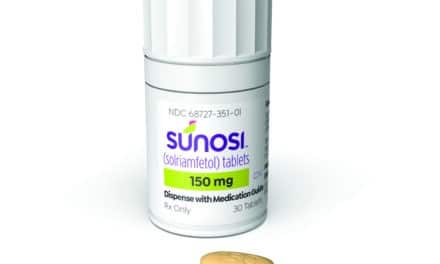 LUNESTA Found Safe for Long-term Use and Helpful for Menopausal Women LUNESTA Found Safe for Long-term Use and Helpful for Menopausal WomenNew research findings drew Sepracor Inc, Marlborough, Mass, to San Diego, twice. At the American Neurological Association annual meeting in San Diego, the pharmaceutical developer presented the results from its second 6-month, Phase IIIB/IV study of LUNESTA™ brand eszopiclone in adult patients with chronic insomnia. The study, which included a 2-week discontinuation phase in which all patients were administered placebo, is the second long-term, 6-month, double-blind, placebo-controlled study of LUNESTA in patients suffering from chronic insomnia. In the study, nightly use of LUNESTA 3 mg resulted in statistically significant improvements (P<0.0001) compared with placebo in patient-reported measures of sleep latency, sleep maintenance, total sleep time, and sleep quality. Patients in the study who were treated with LUNESTA reported improved daytime measures including ability to function (P<0.0001), improved daytime alertness (P<0.0001), improved ability to think and concentrate clearly (P<0.0001), and improved sense of physical well-being (P<0.0001), versus placebo. These differences were apparent in the first month of treatment and were maintained throughout all 6 months of nightly treatment. In addition, assessment of patients during the 2-week discontinuation phase, in which all patients were administered placebo, showed no evidence of treatment-related rebound insomnia or significant withdrawal symptoms when patients stopped taking LUNESTA. “Chronic insomnia has been frequently treated with long-term administration of medications, while studies of nightly treatment with these medications only examined durations of 5 weeks or less. The first 6-month eszopiclone study established the feasibility of the type of longer-term studies needed to guide clinical practice and provided the first clinical study evidence of safety and sustained efficacy over a duration of well beyond one month,” said Andrew Krystal, MD, director of the Sleep Disorder Research Laboratory and Insomnia Program at Duke University Medical Center and a lead investigator for the Sepracor study. “Together, the results of these two large-scale, placebo-controlled studies provide evidence that tolerance and withdrawal are not characteristics of nightly treatment with eszopiclone 3 mg for periods as long as 6 months. These data represent the first solid empirical basis for making clinical decisions regarding a medication of the sort needed in the management of the many patients suffering from chronic insomnia.” But this was not the only positive research finding Sepracor Inc had to share. It also came to San Diego for the North American Menopause Society’s annual meeting where it presented the results from its Phase IIIB/IV study evaluating safety and efficacy of LUNESTA brand eszopiclone for treatment of insomnia in perimenopausal and menopausal women. “One of the effects associated with perimenopause and menopause is increased incidence of waking up during the night and an inability to fall back to sleep, principally due to hot flashes,” said Claudio N. Soares, MD, PhD, associate professor, Department of Psychiatry and Behavioral Neurosciences, McMaster University, and codirector, Women’s Health Concerns Clinic at St. Joseph’s Healthcare, Hamilton, Canada. “This study of LUNESTA in women experiencing perimenopausal and menopausal symptoms suggests that LUNESTA may provide them with relief from insomnia and therefore could potentially lead to a significant improvement in their quality of life.” Compared to baseline and averaged over the double-blind period, women treated with LUNESTA reported fewer total nocturnal awakenings (P<0.0001) and fewer awakenings due to hot flashes (P=0.001) compared to those patients administered placebo. |

Pro-Tech Services Inc, Mukilteo, Wash, has received its first National Institutes of Health (NIH) grant. The sleep sensor solutions manufacturer will use the $400,000 Phase 1 Small Business Innovation Research (SBIR) award from the NIH for its Peer-to-Peer Knowledge Integration Platform for Heterogeneous Data in PSG project, which is geared toward the development of Web-centric methods and tools for distributing and sharing integrated polysomnographic data.
As part of the project, Pro-Tech Services plans to develop software for the rapid handling of PSG information using an XML dialect. This dialect, named SleepXML (www.Sleep XML.org), was recently developed by Pro-Tech and aims to provide a flexible, extensible, nonproprietary, open electronic language capable of describing polysomnographic data and presenting tools for data transformation, archiving, and exchange.
“What makes this competitive award significant is the selection of Pro-Tech Services by a peer review process,” said Jim Johnson, CEO and president of Pro-Tech Services Inc. “We want to emphasize the fact that SleepXML is not a new format to describe PSG events and other data; it is a common XML-based language that allows different labs or research groups to have different definitions of their data and still to be able to understand each other and exchange the data.”
| AEIOMed Changes Names Fans of AEIOMed’s products will soon find a few of them under new names. “We made a move to change our AEIOMed product branding strategy to emphasize the portability and flexibility of our CPAP and nasal interface,” said Holly Larkin, RPSGT, senior director of marketing and clinical affairs for the Minneapolis-based company. The Aura—a lightweight, compact CPAP system that features heated humidification and its own integrated battery pack—is now the Everest™. In addition, the name of AEIOMed’s nasal interface without facial straps and pads for ease of use and patient comfort is now the Headrest™ with nasal seal. |
Respironics Ends Record Year
Respironics Inc, Murrysville, Pa, closed out fiscal year 2005 reporting record financial results. The year was marked by the company’s continued leadership in the global OSA marketplace, further acceptance and adoption of the company’s ventilation therapies in various geographic markets, successful international expansion, and the emergence of Children’s Medical Ventures as a growth driver for the company. In addition, Respironics says it made significant progress in fostering the development of new growth drivers for its business, including the screening, diagnosing, and treatment of other sleep disorders.
Domestic home care product sales for fiscal year 2005 were driven primarily by growth in the sales of sleep apnea therapy devices, masks, and accessories, which represented 19% growth, or $62.8 million of the increase over the prior year. Respironics says it achieved this growth in OSA therapy through successful product introductions and its overall product breadth. Continued acceptance and recognition of C-Flex™ technology; the strength of its sales force; strong sales channels with sleep laboratories, thought leaders, and home care providers; and the success of customer programs further contributed to the growth of the domestic OSA therapy market.
| Clinical Study Shows Light Therapy Effectiveness The Litebook Company Ltd, Medicine Hat, Alberta, Canada, announced that results of a clinical study of The Litebook®—a small LED light therapy device delivering polychromatic white-appearing light of known composition—have been released. In the study titled “A Controlled Trial of The Litebook Light-Emitting Diode (LED) Light Therapy Device for Treatment of Seasonal Affective Disorder (SAD),” researchers assessed the effectiveness of the The Litebook in the treatment of SAD. The randomized, double-blind, placebo-controlled trial at six centers revealed that treatment with The Litebook is an effective therapy for SAD as assessed by both clinicians (Hamilton Depression Rating, Clinical Global Impression) and patients (Beck Depression Inventory). The short treatment time (30 minutes) and portability of the device may increase patient appeal and adherence over other treatment options, including chemical antidepressants and other light therapy devices. |
Sanofi-aventis, Bridgewater, NJ, has obtained US Food and Drug Administration (FDA) approval for AMBIEN CR™ (zolpidem tartrate extended-release tablets) CIV, a new extended-release formulation of the sleep aid, AMBIEN® (zolpidem tartrate) CIV, for the treatment of insomnia. “Insomnia is a significant public health problem, affecting millions of Americans,” said James K. Walsh, PhD, executive director and senior scientist, Sleep Medicine and Research Center at St Luke’s Hospital in St Louis. “Helping patients stay asleep is recognized as being as important as helping them fall asleep. Ambien CR has shown evidence of promoting sleep onset and more continuous sleep.” AMBIEN CR is non-narcotic and a non-benzodiazepine, formulated to offer a safety profile similar to that of AMBIEN with a new indication for sleep maintenance, in addition to sleep induction. |





